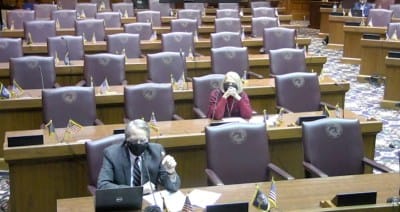Indiana bill on checking executive authority gets first committee hearing

Getting a first committee hearing on Tuesday afternoon was a bill that would put the state legislature in a position to have a say on extending the Indiana governor’s executive orders related to a disaster emergency.

HB 1123 is one of several bills that deal with executive powers, which have been referred to the House standing committee on rules and procedures.
The bills are a reaction by legislators to Indiana governor Eric Holcomb’s executive orders related to the COVID-19 pandemic.
Holcomb, who is a Republican in a state where both chambers of the legislature have better than two-thirds Republican majorities, issued an executive order declaring a public health emergency on March 6, 2020. The governor has extended the executive order several times since then, in 30-day increments. The state of emergency is still in effect.
HB 1123 was authored by representative Matt Lehman, a Republican whose District 79 covers a swatch of the state that’s south of Fort Wayne.
The initial draft proposed by Lehman would prevent a governor’s order from continuing for longer than 30 days, unless the General Assembly is in session, or the governor has called for a special session of the legislature.
Another part of the bill would not add anything new. It would just move a chunk of text related to the requirements of an executive order to a more prominent part of the statute, which Lehman called “front-loading” it.
The chunk of text that would be moved says that an executive order is supposed to indicate “the nature of the disaster, the area or areas threatened, and the conditions which have brought the disaster about or that make possible termination of the state of disaster emergency.”
Tuesday’s committee meeting included a description from Lehman of the bill. It got a couple of clarification questions from two Democrats on the committee, Matt Pierce and Terri Jo Austin. No one testified at Tuesday’s committee hearing.
Chair of the committee, Daniel Leonard, said HB 1123 would be back on the docket next week or the week after that.
One question asked by Pierce, whose District 61 includes a chunk of Bloomington, related to the issue of local control to make restrictions tighter than an executive order. That’s been a key feature of Holcomb’s executive orders on COVID-19.
Even while he’s been critical of the governor’s orders, for not going far enough, Bloomington’s mayor, John Hamilton, has been appreciative of the feature that has allowed local officials to exercise some discretion.
Monroe County commissioners and Bloomington’s mayor have taken advantage of the ability to impose tighter restrictions than in the governor’s order—with respect to mask wearing and the size of gatherings.
On Tuesday, Lehman told Pierce that the issue of local control is not addressed in HB 1123.
Pierce gave the background to his question, which related to Bloomington’s large college student population: “We had to have some regulations to keep the giant parties from breaking out.”
Local control in health emergencies might be affected by a senate bill [SB 48], which would impose a 14-day limit to the duration of COVID-19 health orders that are issued by a county health officer.
Not on the committee is Republican Peggy Mayfield, whose District 60 stretches into eastern part of Monroe County. But Mayfield told The Square Beacon the feedback she’d heard from her constituents about the governor’s executive orders was along the lines of: “You have to rein it in! Why aren’t you doing something?”
Mayfield said that a proposed concurrent resolution that would simply end the state of emergency was problematic, because the state of emergency was a condition for federal money to flow to the state of Indiana. It’s important to distinguish between a state of emergency and an executive order, she said.
Mayfield said that instead of the concurrent resolution, she is more inclined to consider legislation like HB 1123, which affects how long the governor’s executive orders can persist, and the legislature’s role in that.
Mayfield also addressed the idea that Republican lawmakers were looking to add a legislative check on the governor, who is also a Republican. She said the idea was: ”Let’s think about this not in terms of current people or personalities, but as a policy change.” Mayfield added, “We are not after Governor Holcomb. We are after fixing what we have discovered is a weakness in our current statute.”




Comments ()